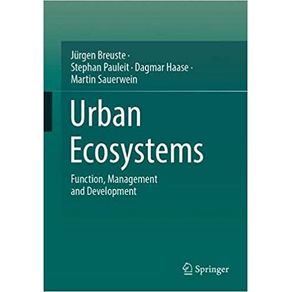This textbook on urban ecosystems answers important questions about the ecological structure, functions and socio-ecological development of cities worldwide. Based on how cities are developing today in an increasingly urbanized world, it explains ecological challenges for cities of the 21st century such as resource efficiency, climate change, moderation of quality of life and resilience. The book combines theories of urban development and ecology with practical applications and case studies, thus identifying potential for improvement and examples of good ecological urban development worldwide. It shows that cities are by far not only problem areas but also offer great potential for a good life and that the various urban ecosystems can make a considerable contribution to this. The "eco-city" is thus not a utopia, but a real goal that can be pursued step by step in a targeted manner, taking into account the local and regional context.
Four renowned urban ecologists have contributed their specific experience in sub-areas without losing sight of the big picture. Jürgen Breuste is an urban ecologist and works at the Paris Lodron University in Salzburg, Austria, on the topics of sustainable urban development, urban biodiversity, ecosystem services and eco-cities. Dagmar Haase is Landschaftsökologin and works at the Humboldt University of Berlin on urban ecosystem services and land use modeling. Stephan Pauleit is a landscape planner and works at the Technical University of Munich on strategies for the sustainable development of urban landscapes. Martin Sauerwein is a geographer and works at the University of Hildesheim on geo-ecology in cultural landscapes, geoarchaeology and soil protection.
The textbook addresses a broad audience of students, teachersand also to practitioners in the fields of ecology, urban ecology, urban development, sustainability, urban geography, nature and landscape conservation, spatial planning, landscape ecology, social sciences and urban st

